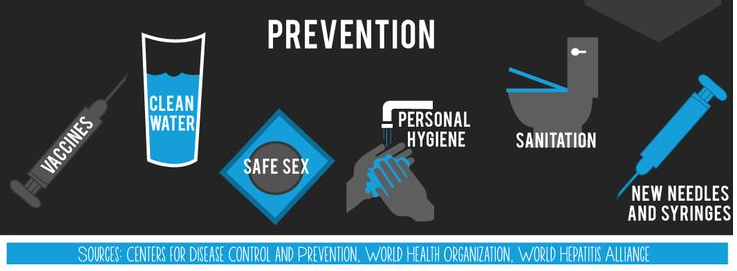The word hepatitis comes from the Ancient Greek word hepar (root word hepat) meaning 'liver' and the Latin 'itis' means inflammation.
What is Hepatitis?
Hepatitis refers to inflammation of the liver. It is mainly caused by virus. It mainly affects the liver. Liver is the largest gland in the human body. It has a wide range of functions including detoxification, metabolism of carbohydrates, fats, and proteins, production of bile, excretion of bilirubin, cholesterol, hormones, and drugs etc. Viral hepatitis can be classified into 5 types based on the virus causing it.
It is named as-
- Hepatitis A
- Hepatitis B
- Hepatitis C
- Hepatitis D
- Hepatitis E
Types of - Hepatitis
Hepatitis A – it is present in the fecal matter of humans and is transmitted through contaminated food and water. Certain sex practices can also spread HAV.It is caused by Hepatitis A Virus (HAV). Infections are usually mild and people make a full recovery and are immune to further infection caused by HAV.
Hepatitis B – it is caused by Hepatitis B Virus (HBV). It is transmitted through infected blood, semen and other body fluids. It can also transmit from infected mother to baby. Transmission may also occur through transfusions of HBV-contaminated blood and blood products, contaminated injections during medical procedures, sexual contact and through injection drug use.
Hepatitis C – it is caused by HCV. This is caused due to direct contact with the infected blood. It is transmitted through blood transfusion, contaminated injections and sexual transmissions.
Hepatitis D –is caused by HDV. It comes only if the person is already infected with hepatitis B. The dual infection of HDV and HBV can result in a more serious disease and worse outcome.
Hepatitis E – it is caused by HEV. It comes through contaminated food and water. Hepatitis E is a common cause of hepatitis outbreaks in developing parts of the world.
Non-viral hepatitis is caused due toheavy alcohol use certain medications, toxins, other infections, autoimmune diseases.
Symptoms
The general symptoms includes –
- Diarrhea
- Fatigue
- Jaundice(yellowing of skin and eyes)
- Dark urine
- Loss of appetite
- Mild fever
- Abdominal pain
- Weight loss
- Nausea
- Vomiting
- Muscle aches
Diagnosis
It is done by -
- Physical examination of the signs and symptoms
- Liver biopsy
- Liver function test
- Blood tests
- Ultrasound imaging
- Viral antibody testing
Treatment
Treatment is given based on the type of hepatitis –
- Hepatitis A - is not usually treated. Bed rest is suggested
- Hepatitis B – antiviral medications like interferon are given. Proper rest and protein and carbohydrate rich diet is also suggested
- Hepatitis C – patient with hepatitis C will be prescribed pegylated interferon and ribavirin
- Hepatitis D - Hepatitis D is difficult to treat, and effective treatments are lacking. Interferon alpha is usually given on temporary basis
- Hepatitis E – there is no specific treatment as such. People are advised bed rest and intake plenty of fluids and nutrients
.jpg)
.jpg)
